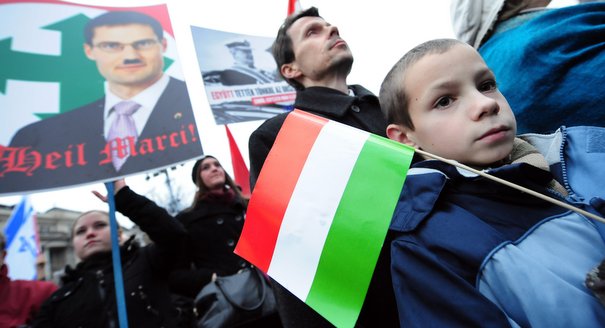This past Sunday, over 10,000 Hungarians gathered in front of the parliament in Budapest to protest against the virulent anti-Semitism of the far-right wing party Jobbik.
Jobbik—the Movement for a Better Hungary—which won almost 17 percent of the vote in the 2010 parliamentary election, has not hidden its deep dislike of the Roma community and the Jews.
But the party took a new and more insidious turn two weeks ago during a debate in parliament about the military conflict between Israel and Hamas in Gaza.
Márton Gyöngyösi, the deputy parliamentary leader of Jobbik, demanded that “all Jews in Hungary be registered.” As for Jews in parliament and the government, Gyöngyösi said they “should be evaluated for the potential danger they pose to Hungary.”
Zsolt Nemeth, the state secretary in the foreign ministry and the foreign affairs expert for the governing conservative Fidesz party was attending the debate.
“I think you owe Hungary such a compilation,” Gyöngyösi told him. Nemeth simply replied: “The number of Jews in the Hungarian government has nothing to do with the serious conflict in the Middle East.” There was not a word of criticism about drawing up a registry of Jews.
A day later, Fidesz, led by Prime Minister Viktor Orban released a bland statement. It pledged to fight against extremism, anti-Semitism and racism. Gyöngyösi apologized. He only meant that those who had dual Hungarian-Israeli citizenship should be screened. “I apologize to my Jewish compatriots for my equivocal statement,” he said.
That was not enough for civil society groups wanting the government to take a much more robust stance against growing anti-Semitism in Hungary. Hence last Sunday’s demonstration.
In a rare show of unity for a country so politically polarized, conservative and left-wing parties spoke out against Jobbik and waved big banners denouncing fascism and Nazism. Few analysts are convinced this unity will last. The divisions between Hungary’s left and right are too entrenched and too bitter to allow a more moderate political climate to emerge. But at least Hungarian society is beginning to stand up to Jobbik.
Fidesz, which was swept into power in 2010 should be taking the lead in combating anti-Semitism. But it isn’t. Orban, who speaks constantly about the unity of the Hungarian nation and the historical and noble roots of Hungary, is always looking over his shoulder to check Jobbik’s popularity.
Fidesz’s own popularity has plummeted to around 22 percent depending on the opinion polls. Jobbik’s is at around 10 percent. But does Orban, a former dissident during the communist era, really have to pander to the nationalist far-right movements to keep Jobbik at bay and increase Fidesz’s appeal? If he does, then Orban becomes dangerously close to a national conservatism that is exclusivist and even chauvinist.
Earlier this year, Orban refused to speak out about the unveiling of a statute to Admiral Miklos Horthy, Hungary’s inter-war leader and a known anti-Semite. Last May, the president of the Parliament, Fidesz lawmaker Laszlo Kover, took part in a memorial for Jozsef Nyiro, a writer and staunch supporter of Hungary’s national-socialist, anti-Semitic Arrow Cross party, which governed the country in the closing stages of World War Two. By the time the Nazis invaded Hungary in March 1944, tens of thousands of Jews were already in the ghettos in Budapest. Within a few weeks, over 430,000 Jews were deported to Auschwitz. The school curriculum, sanctioned by Fidesz, now includes writers such as Nyiro.
Then in September, Orban delivered a passionate nationalist speech in the village of Opusztaszer where, according to historians, Arpad, the founder of the Hungarian royal house, had summoned Hungarian notables to promote the unity of the Hungarian nation.
Indeed, Orban, with his harking to the past, his criticism of the EU for interfering in Hungary’s affairs, and his support for more state control over the economy to ward off foreign investors, seems to be promoting an inward-looking and nationalist Hungary. In that sense, Fidesz and Jobbik are chasing after some of same voters.
A report published last March by the Anti-Defamation League that conducted surveys of attitudes towards Jews in ten European countries, showed that Hungary topped the list for its anti-Semitic attitudes.
It is not because Hungary is home to a large Arab community. Compared to several European countries where anti-Semitism and attacks on Jews are often linked to the Israeli-Palestinian conflict and to tensions with Arab communities towards Jews, Hungary’s Arab community is negligible. Hungary’s politicians know that the problem is homegrown.
It is high time that Orban took a stand against Jobbik in order to stop this rise of anti-Semitism.





.jpg)
